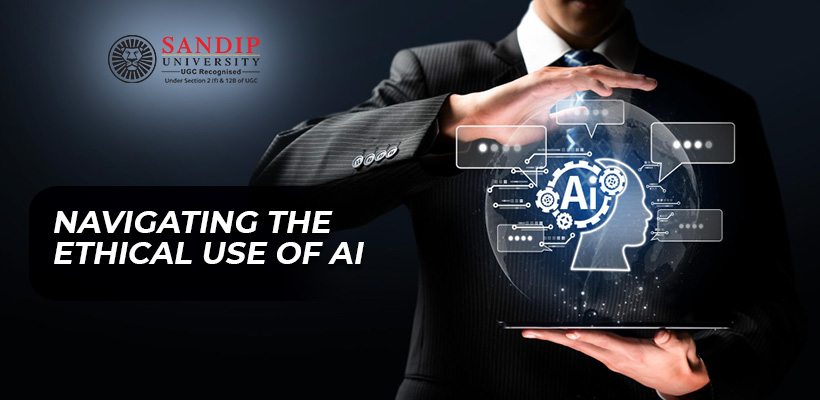Artificial Intelligence (AI) is likely to change a lot of things, including the environment, global productivity, equality and inclusion, and a lot more. A lot of people have said that AI can help and at the same time upset the sustainable growth. AI is getting more and more attention because it has the potential to make enormous progress in many areas, from self-driving cars to personalised medicine. Many top law colleges in Maharashtra are engaging in dialogue regarding the ethical implications of integrating AI into our day-to-day lives.
Among the 17 ambitious goals prepared by the UN to make the future better for everyone in this world, to fight climate change and end hunger are two of these crucial goals. Likewise, AI is being used in more and more academic institutions as tools to help students learn in their own way. Anyone can learn from this, and it might even get students more interested and help them do better.
AI for Sustainability and AI for Surveillance: Is the Two Sides of the Same Coin Approach Possible?
Two different ways to use AI are for surveillance and for sustainability. People all over the world are affected by issues like climate change, managing resources, and protecting animals. AI for sustainability wants to help bring these issues to light. AI is used to spy on people, though, to see what they do, keep everyone in line, and make things safer.
Having AI that cares about people and the environment makes things better for both groups. When AI is used for surveillance, people worry about privacy, bias, and potential abuse. On the other hand, AI helps keep people safe and the cops do their jobs. AI used for sustainability is seen as a good thing that helps the world grow and make life better for everyone. More people don’t want AI to be used for spying, especially when it’s not transparent or accountable.
A lot of the time, AI needs to gather a lot of data to work better. Like, it could have to keep track of how much power is used and how people interact with the world. This makes better use of resources and helps fight climate change, but it also makes people worry about privacy, agreement, and who owns the data. Not everyone’s needs and wants can be met at the same time. People’s rights could be at risk, though, if this kind of spying is done without being clear or with no protections.
The Ethical Dilemma: Efficiency vs. Liberty
So, how can AI help make the future more sustainable without putting people’s rights at risk? The best way to ease this conflict is to design AI in an ethical way and keep data safe. What Law students can do to help make AI more ethical? For AI to be ethical, we need a plan that includes many areas and is based on being fair, honest, and responsible. Law students could make a big difference in the future. They can look into how AI changes society, find programs that aren’t fair, and make rules about what is right and wrong.
By making technologies that are based on people, they can make sure that AI tools respect user rights and different points of view. Law students can use campus groups and the internet to bring attention to AI problems, report unethical behaviour, and push for AI to be used in a responsible way. Law students may write policy briefs, or work with lawmakers to change the rules that limit the growth of AI. As a whole, students are not only people who are learning; they are also people who are making the world of AI more ethical.
The Balance between AI and Sustainability
AI could help fight climate change, save energy, and lessen waste to make the world a better place to live. Being fair means making sure AI does more good than bad for the world. We need to use green data centres and make programs that use less power. We should also only use AI when it will really help in the long run. The end goal is to use AI in a way that is not only smart but also wise, so that care for the world and progress in technology go hand in hand.
In the end, AI is not inherently good or bad. It is made and used by people who change it to meet their wants. Our beliefs, ethics, and goals should guide the way we build it. It will either be used to fight climate change or to spy on many people. The hard part will no longer be the system itself. It will make sure that AI works for everyone, doesn’t violate people’s rights, and gives everyone a fair future.
There isn’t a quick fix. AI could be very helpful, but it’s important to know what harm it can cause. With AI, people in countries with less money might not be able to get to technology that is useful for learning. Set up a two-tier system so that AI-based personalised learning only helps kids in countries that have more money. There might be a bigger difference between them now.
Conclusion
From an ethical point of view, it’s also very significant to worry about data protection and security. This is especially important when working with private information about people, like when you’re in the healthcare field. Laws and rules must be in place to ensure that data is gathered, stored, and used in a smart way. Some of the best law colleges in Nashik are leading the discussion on the ethical use of AI.
Every country should follow the same rules. Finally, it might be even more important to be honest about choices in a world where AI makes the laws. AI might be good at some things, like finding out how many people are poor, but it might be bad at finding out who needs help from other people.

